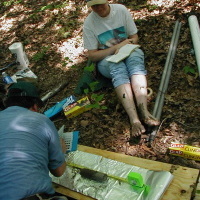
Ingo Brigandt
My work combines the history and philosophy of biology with epistemology and the philosophy of mind and language by attempting to understand scientific practice and concept use (including its historical change) from an epistemological and semantic point of view.
I am particularly interested in the field of evolutionary developmental biology (evo-devo) and its 19th and 20th century antecedents.
My recent research includes theories of concepts, the rationality of semantic change, how the context-sensitive use of scientific terms supports successful practice, integrating different approaches and explanations in evolutionary and developmental biology, and non-reduction in biology.
Phone: +1 780-492-9030
Address: Ingo Brigandt
Department of Philosophy
2-40 Assiniboia Hall
University of Alberta
Edmonton, AB T6G 2E7
Canada
I am particularly interested in the field of evolutionary developmental biology (evo-devo) and its 19th and 20th century antecedents.
My recent research includes theories of concepts, the rationality of semantic change, how the context-sensitive use of scientific terms supports successful practice, integrating different approaches and explanations in evolutionary and developmental biology, and non-reduction in biology.
Phone: +1 780-492-9030
Address: Ingo Brigandt
Department of Philosophy
2-40 Assiniboia Hall
University of Alberta
Edmonton, AB T6G 2E7
Canada
less
Related Authors
Robert Lickliter
Florida International University
Galen Strawson
The University of Texas at Austin
Na'ama Pat-El
The University of Texas at Austin
Kristen J Gremillion
Ohio State University
Richard Bellamy
University College London
Shaun Gallagher
University of Memphis
Louis de Saussure
University of Neuchâtel
Armando Marques-Guedes
UNL - New University of Lisbon
Stephen Yablo
Massachusetts Institute of Technology (MIT)
Gwen Robbins Schug
University of North Carolina at Greensboro
InterestsView All (14)










Uploads
Papers by Ingo Brigandt
Mechanistic explanation (in terms of the qualitative interactions of the structural parts of a whole) has been developed as an alternative to the traditional idea of explanation as derivation from laws or quantitative principles. Against the picture promoted by Carl Craver, that mathematical models describe but usually do not explain, my discussion of cases from the strand of evo-devo which is concerned with developmental processes points to qualitative phenomena where quantitative mathematical models are an indispensable part of the explanation. While philosophical accounts have focused on the actual organization and operation of mechanisms, properties of developmental mechanisms that are about how a mechanism reacts to modifications are of major evolutionary significance, including robustness, phenotypic plasticity, and modularity. A philosophical conception of mechanisms is needed that takes into account quantitative changes, transient entities and the generation of novel types of entities, feedback loops and complex interaction networks, emergent properties, and, in particular, functional-dynamical aspects of mechanisms, including functional (as opposed to structural) organization and distributed, system-wide phenomena. I conclude with general remarks on philosophical accounts of explanation.
Mechanistic explanation (in terms of the qualitative interactions of the structural parts of a whole) has been developed as an alternative to the traditional idea of explanation as derivation from laws or quantitative principles. Against the picture promoted by Carl Craver, that mathematical models describe but usually do not explain, my discussion of cases from the strand of evo-devo which is concerned with developmental processes points to qualitative phenomena where quantitative mathematical models are an indispensable part of the explanation. While philosophical accounts have focused on the actual organization and operation of mechanisms, properties of developmental mechanisms that are about how a mechanism reacts to modifications are of major evolutionary significance, including robustness, phenotypic plasticity, and modularity. A philosophical conception of mechanisms is needed that takes into account quantitative changes, transient entities and the generation of novel types of entities, feedback loops and complex interaction networks, emergent properties, and, in particular, functional-dynamical aspects of mechanisms, including functional (as opposed to structural) organization and distributed, system-wide phenomena. I conclude with general remarks on philosophical accounts of explanation.